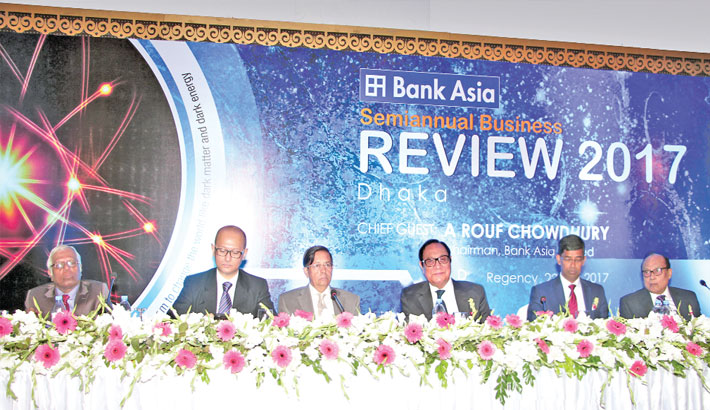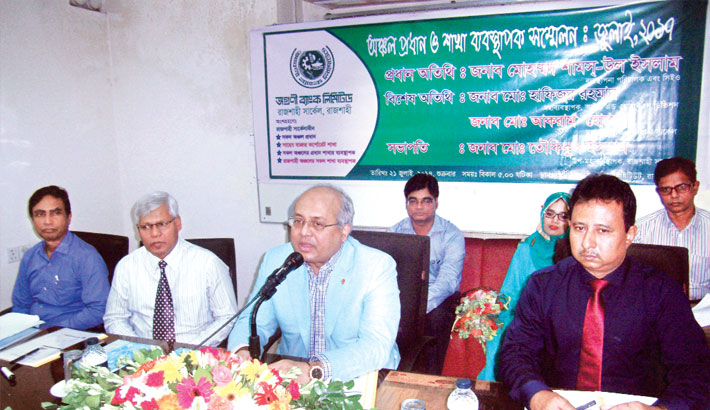Banking
Bank Asia organises half-yearly business review meeting

Chairman of Bank Asia A Rouf Chowdhury is seen at the Half-yearly Business Review Meeting for Dhaka Zone of the bank at a hotel in the city on Saturday.
Bank Asia arranged Half-yearly Business Review Meeting-2017 for Dhaka Zone at a hotel in the city on Saturday.
Chairman of the bank A Rouf Chowdhury inaugurated the meeting as chief guest, said a press release.
Vice Chairmen Mohd Safwan Choudhury and AM Nurul Islam, Chairman of Board Audit Committee Md Mashiur Rahman, former Chairman of Board Executive Committee Rumee A Hossain and President and Managing Director Md Arfan Ali, among others, were present at the meeting. With the participation of the Heads of all Branches from Dhaka Zone, SME or Agri Branches, top executives and departmental heads of Corporate Office, the meeting became interactive and lively.
A critical review of the business performance of the bank in the first six months of the year was made at the meeting.
Taking previous experience into consideration and analysing the industry and economic outlook, a strategic action plan was drawn to face the economic challenges and achieve the objectives and goals for upcoming months.
News:Daily sun/23-jul-2017Agrani Bank holds branch managers' conference

Chief Executive Officer and Managing Director of Agrani Bank Limited Mohammad Shams-Ul Islam speaks at a zonal head and branch managers' conference at Agrani Bank Training Institute in Rajshahi on Saturday.
Agrani Bank Limited organised a zonal head and branch managers' conference at Agrani Bank Training Institute in Rajshahi on Saturday.
Chief Executive Officer and Managing Director of Agrani Bank Limited Mohammad Shams-Ul Islam attended the seminar as chief guest, said a press release.
A total of 9 Zonal Heads, Corporate Head and the Branch Managers of Rajshahi Circle took part at the conference.
Rajshahi Circle Office General Manager Md Akram Hossen was present as special guest while Rajshahi Circle Office Deputy General Manager Md Towfiqul Islam presided over the meeting.
During the conference, Business development strategies, deposit and advance flow increase, credit recovery status are discussed and necessary directions were given.
Many activities like improved customer service, fast and easy payment of foreign remittance and potential customer search are also emphasised on the occasion.
Moreover, different strategies to achieve current year business target are focused in the seminar.
News:Daily sun/23-jul-2017CID yet to submit charge sheet

One and a half years have elapsed since the investigation into the Bangladesh Bank fund heist began, but little progress has been made in the probe.
Bangladesh has managed to retrieve only around $36 million of the total $101 million stolen from the central bank’s account with Federal Reserve in the US.Investigators are still unsure about how the rest of the money could be recovered.
Dhaka Chief Metropolitan Magistrate’s Court deferred the probe report submission deadline for 13 times on time petition by the investigators of CID.
Finally, on June 19, Dhaka Metropolitan Magistrate AKM Mainuddin Siddique directed CID to submit the report by July 30 in the case.
Sources at CID said they sent letters to the countries concerned requesting their authorities to arrest the suspects in the heist and provide Bangladesh with the information extracted from them.
An investigator told the daily sun the probe is almost complete and they will submit the charge sheet after getting the reply from those countries.
At least 40 to 45 persons, including foreigners, are accused in the case filed on charges of criminal offences and negligence of duty.
CID officials said the investigation is at the final stage.
“Apart from Bangladesh, people of eight countries were involved in the incident. So the investigation is taking time,” an official said.
Mollah Nazrul Islam, Special Police Super of CID’s organised crime department, said, “We sent the letters through the embassies of those countries for arresting some suspects in their respective countries and supply us the information extracted from them.”
INTERPOL is coordinating with the concerned countries’ law enforcement agencies over the investigation of the much-talked fund heist.
Investigators said they found involvement of 10 to 12 Bangladeshi nationals and 30 to 35 people of eight countries, including Philippines, China, Sri Lanka, Egypt, Japan, Singapore, Hong Kong—-with the heist.
“It is very difficult to interrogate and take legal action against people in other countries without the help of the concerned law enforcers in those countries, said a CID official.
Apart from the CID, the police headquarters, Police Bureau of Investigation (PBI), Dhaka Metropolitan Police (DMP) and Special Branch (SB) are also helping the investigation.
A team comprising all the departments lead by CID’s organised crime department’s Additional Police Super Raihan Uddin Khan is investigating the case filed under Money Laundering Prevention Act and the ICT Act with Motijheel police station in the capital.
On February 4, 2016, hackers attempted to steal $101 million from Bangladesh Bank’s account with Federal Reserve Bank in New York.
On March 15, 2016, investigation began after a case was filed on the same day the then governor of Bangladesh Bank Dr Atiur Rahman resigned amid huge criticism over the incident.
Of the $101 million, transfer of $20 million was immediately stopped by a Sri Lankan bank but the hackers managed to transfer $81 million to Rizal Commercial Banking Corporation (RCBC) in the Philippines.
Bangladesh also retrieved $68,000 that was left behind by the hackers at RCBC.
A probe panel formed by the Bangladesh Bank, headed by former governor Mohammed Farashuddin, submitted its report to the Finance Ministry on May 30, last year, but Finance Minister AMA Muhith did not release the committee’s findings despite repeated pledges to do so.
News:Daily sun/23-jul-2017
Trade Risk and Management Strategies in Banks

Payments as well as the delivery of goods in international trade can be challenging and may present trading partners with a number of risks. These risks can be minimised or mitigated by choosing the right payment and credit terms and by using payment instruments that enable exporters and importers to manage their trade risk exposures.
Risks in the international banking activities are mostly related to the trade payment and financing activities considering the fact that these are the major activities of international banking in Bangladesh.
Most of the cases the risks are related to non-compliance of regulation or guidelines.In Bangladesh, trade services products are those services that are commonly offered from the ‘Trade Services Department’ of a bank. In broader sense, trade services products of Bangladesh includes products or services related to trade payment and trade finance. Bangladesh Bank is the regulatory authority for regulating and supervising all trade services activities where ADs offer services as the agents or dealers of Bangladesh Bank. Banks are required to follow both a set of domestic regulations and international rules/guidelines while offering trade services as shown in table 1.
In general four categories of trade payment method are in use to facilitate and receive payments in Bangladesh i.e. cash in advance, open account, documentary collection and documentary credit. A mix-up of more than one is followed in some cases; however whatever may be the method of payment the very first step is the contract between exporter and importer. Exporters and importers need financing facilities to establish their cross-border purchase and sale. At different stages of production and payment, traders obtain financing facilities from banks. Financing pattern also vary in different methods of payment. Financing to the exporters can be grouped under pre-shipment and post-shipment financing; and financing to the importers can be categorised into pre-import and post-import financing.
A variety of risks is involved in the trading of goods. While some of these risks will affect domestic trade, they are generally amplified in international trade. The most common trade risks includes finance related risk, payment related risk, documentation risk, economic risk, foreign exchange risk, interest rate and price risk, crime and money laundering risk, buyer’s insolvency/credit risk, buyer’s acceptance risk, knowledge inadequacy, seller’s performance risk, country risk, cultural risk, legal risk, political and sovereign risk and transit risk. Common Trade Risks in Banks are described below:
In LC operations, late payment has been found to be a common practice by the trade service providing banks. In spite of receiving compliant documents under sight LCs, the payments have been lingered which don’t only harm the institutional reputation but also the image of Bangladesh. The applicants request the banks to lodge discrepancy notices to halt the payment momentarily on the grounds such as goods had not arrived or goods were of inferior quality. The applicants also approach the issuing banks to linger payment through issuing discrepancy notices in spite of the arrival of consignment. Banks are also cooperating with them in some instances which also inflate the confirmation charges of the LCs issued from Bangladesh. This practice creates huge country risk as well as reputational risk with counterparts.
In the context of Bangladesh, there are instances where banks reject documents just for rejection and charges for the discrepancies as their foreign counterparts do. These are clear departures from the UCP morals. Such practices can simply make the trades costlier and burdensome to the consumers generating economic and other associated risks.
These practices along with sudden price decrease in global market are creating forced loan, rescheduling and converting non-funded liability into funded liability in Bangladesh. In some circumstances, banks also delay payment to protect their interest which is undesirable under UCP rules. And this scenario creates both credit risk/default risks and liquidity risk for banks also.
For making the payment under local Back to Back LCs (denominated in FC) there are two alternatives for banks i.e. Nostro Accounts (using swift MT 202) or they can use the FC Clearing Account maintained with Bangladesh Bank. Many banks are utilising the services of foreign correspondent abroad as the payments are affected through the Nostro Account which is maintained with them which results in FC outflow in the form of charges from Bangladesh just to gain in business with the correspondent agents resulting in higher revenue in the form of charges which may create legal risk and non-compliance risk as well.
In banking industry of Bangladesh, some instruments trade like LCs or guarantees are used for fraudulent or unethical practices in performing local trading activities. The issue of accommodation bill (payment without genuine consignment) related with shipment under local LCs is severe concern augmenting various risks including delivery risk of the consignments.
Most of the local banks in Bangladesh, for domestically transferred and transferable LCs transfer through endorsement on the back of the master LCs which raises the scope for fraudulent practices and forgery.
As per BB Guidelines on Foreign Exchange Transactions (GFET-2009) banks are required to obtain confidential reports for opening of an LC on foreign exporters where amount exceeds USD 10,000 and USD 20,000 against proforma invoices and against intents issued by local agents of suppliers respectively. Banks are issuing LCs without obtaining credit reports only incorporating credit report clauses which is a sheer violation of the GFET and obviously raises the risks of both the issuing bank and the importer.
To retain the clients in this competitive market, some banks (a few instance) are sometimes undertaking undue risks even bypassing the regulatory framework, e.g. financing by the Ads to the exporters through opening back to back LCs (deferred by 180 days) upon open account trade which could be extremely risky if the foreign buyers default or do not make payment. Mentionable, as the associated ADs are endorsing the transports documents (title to the goods) to the foreign buyers directly, it could prove to be very risky.
Insurance coverage is supposed to be offered by the importers in Bangladesh. Banks are supposed to ensure minimum insurance coverage of 110 per cent of importable at the time of opening LCs. But some banks open LCs are opened ensuring only 100 per cent of the importable. Hence, breach of Bangladesh Bank rules is very apparent creating huge risk exposure of the Bank.
In case of importing restricted items that require permission from the appropriate authority issuing banks are suppose to incorporate the documents as well as certain conditions. In general, documents are asked for but conditions are not incorporated exposing banks in documentation risks.
Some banks make payments as per the requirement of LCs but goods never arrived and banks are in trouble. Such instances are found where sight LCs is issued with TT reimbursement clause by a Bangladeshi bank and the scenario exposes huge risks.Risks also prevail in banks in the area of non-realization of export proceeds. Banks are expected to behave responsibly and report to Bangladesh Bank within stipulated time. But there are instances where ADs of banks do not report to Bangladesh Bank and also banks cooperate with the exporters in fraudulent activities holding reporting risks also.
As per the directives of BB, the banks are absolutely prohibited from engaging themselves in transactions with speculative motives in respect of FX market but some treasuries of banks hedge the risks of the clients through options and so not report to evade the possible difficulties.
Transactions on option require case to case approval from Bangladesh Bank. Earning profit and collection of charges are the main objectives behind these malpractices resulting new risk dimension for the entire banking industry.
Sometimes banks in Bangladesh do not renew the guarantee requirement for continuing with inward remittance services. Some banks have undue practices in mobilizing inward remittance through exchange houses, for which Bangladesh Bank can duly penalize them. In maintaining FX accounts, some irregularities are there mainly due to the knowledge gap of the bankers.
Four techniques of Trade Based Money Laundering (TBML) i.e. over and under invoicing of goods and services; over and under shipment of goods and services; multiple invoicing; and falsely described goods and services. In Bangladesh over and under invoicing of goods and services, and falsely described goods and services are common in use for money laundering. To hide or profitable use of the proceeds of crime through illicit outflows of funds from Bangladesh the criminals use over pricing in imports, generally low duty item like capital machineries, raw materials and spare parts and under pricing of export. For gaining government benefit like cash incentives, subsidies there are tendencies of over pricing of exported items wherein collected wage earners’ remittance is used to fill the rest of the export proceeds.
Sanctions clause is commonly found in the LCs received from abroad. Now-a-days the local have also started inserting Sanction clause in their LCs issued from Bangladesh which do not match with the expectation of the approach of ICC. These types of clauses may offer negative perception at the initiation of the transactions.
International trade exposes exporters and importers to substantial risks. To mitigate these risks, firms can buy special trade finance products from banks. Major ways to mitigate trade risk in banks are described below:
Minimising risks through precautionary measures: Importers and exporters can take precautionary measures to avoid or minimize some trade risks wherein banks can play a pivotal role. For example, in order to avoid quality issues before they arise, importers should research the quality of the products and verify the general reputation of the seller before the placement of an order.
Negotiating the right type of payment and credit terms: The question of when and how a payment is made will determine how the counterparty risk is distributed between the exporter and the importer. In this sense the negotiation of favourable payment and credit terms or the use of risk mitigating payment instruments is an important element of the management of counterparty risks in trade.
Introduction of modern communication and service rendering devices in the foreign exchange department: In various facets of import financing, modern IT devices should be introduced for increasing overall efficiency of the service. Communication of letter of credit to the negotiating banks, negotiation regarding LC conditions, conformation of letter of credit and payment of import bills are the areas where modern IT devices should be employed specially in those banks where there exist room for improvement.
Developing hearty banking relationship with foreign banks in important parts of business world: For handling import trade systematically and effectively, there is a need for developing sound relationship with foreign banks which can operate as negotiating banks for the bank issuing letter of credit. This relationship building can facilitate prompt handling of import operations including the payment aspects.
Strict adherence to Bangladesh Bank guidelines in processing import financing: The foreign exchange department of the bank must follow the Bangladesh Bank guidelines strictly to avoid any future problem in the management of import financing. Bank officials dealing in foreign exchange must be thoroughly conversant with these rules and in evaluating application for letter of credit. All points must be examined with utmost care and prudence. This may also help to protect national interest.
Strengthening advisory services by the bank for the new and inexperienced import firms: New and inexperienced import firms experience problems in handing various aspects of import financing. These firms need sound advisory services from banks to handle all technical aspects precisely. Bank officials in the foreign exchange department can work as helping hand to assist these firms. For this purpose, technically sound team must work in the advisory cell of the foreign exchange department of the bank.
Credit insurance: Credit insurance is an alternative to letters of credit, which can be expensive and time-consuming. Credit insurance protects the exporter from the risk of default by the importer. Credit insurance can cover specific circumstances such as the importer’s bankruptcy, refusal to pay or country risks such as political upheaval. It is possible to insure all of a supplier’s clients or simply specific customers or transactions.
Factoring: Factoring is limited as a mitigation instrument for trade risks in Bangladesh. Factoring firms that offer international factoring and if non-recourse factoring is employed the factor takes on the credit risk of all trade receivables which can be initiated in banking industry of Bangladesh
Forfaiting: Forfaiting is carried out on a non-recourse basis because the instrument sold is an obligation of the customer which also enables exporters to trade in higher risk countries although the higher risk will be reflected in the cost. Forfaiting can be expensive to arrange as the company will have to pay for the financing arrangement and the guarantee, henceforth proper care should be adopted before taking this strategy.
Supplier finance: Supplier finance, also known as reverse factoring, is initiated by the buyer (not the seller), typically to extend payment terms without damaging the supplier relationship or the ability of the supplier to deliver in time. In supplier finance, a bank in Bangladesh can pay the exporter as soon as the importer has confirmed the invoice. The bank will be repaid later by the buyer. Supplier finance can be offered on a non-recourse basis, which means that the exporter is not liable for non-payment by the importer.
Exporter as well as importer have to decide which risks to tolerate and which risks to manage. Ultimately a cost-benefit analysis must determine which instrument is best suited to mitigate the identified trade risks. Hence, the banks in Bangladesh can play advisory roles in expanding trade literacy among the traders which will ultimately benefit them in handling trade business. Moreover, a company’s specific situation with regard to financing needs and customer relationships must be taken into account while addressing the trade risk mitigation although in most cases not all trade risks can be mitigated. However, all required strategies must consolidated to obtain both short term and long term benefits in international trade business for a forward moving country like Bangladesh.
The writer, a banker by profession is a Certified Expert in Risk Management (CERM) from Frankfurt School of Finance, Germany. The views expressed in the article are the writer’s own and not necessarily the organization he represents.
News:Daily sun/23-jul-2017Ashraf-Ul Islam made DMD of SBL
 Syed Ashraf-Ul Islam has recently been promoted to Deputy Managing Director (DMD) of Sonali Bank Limited, said a bank statement.
Syed Ashraf-Ul Islam has recently been promoted to Deputy Managing Director (DMD) of Sonali Bank Limited, said a bank statement.
Prior, he was serving as General Manager of Bangabandhu Avenue Corporate Branch of the bank.
Islam started his banking career in 1984 as System Analyst officer in the bank after completion post graduation degree in Economics from Rajsahi University and letter he obtained MDP degree from IBA in University of Dhaka.
During his thirty three years long banking career Islam served as branch in charge of many branches including General Manager of Bangabandhu Avenue Corporate Branch. He took part in Training on banking in home and abroad like USA, French, Switzerland, Turky, Malaysia and India.



